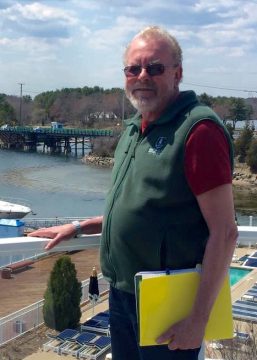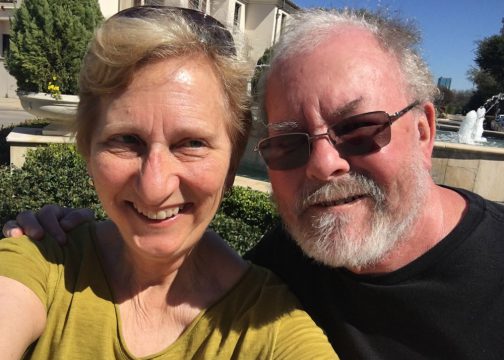 Charisma—we can’t always define it, but we know it when we see it. And by all accounts Ron Taylor was charismatic. A professor of microbiology and immunology at Geisel School of Medicine, Taylor died on March 26 at age 62 of a heart attack. His good-natured personality and intellectual assets, beloved by faculty, students, and staff alike, were well suited to academe.
Charisma—we can’t always define it, but we know it when we see it. And by all accounts Ron Taylor was charismatic. A professor of microbiology and immunology at Geisel School of Medicine, Taylor died on March 26 at age 62 of a heart attack. His good-natured personality and intellectual assets, beloved by faculty, students, and staff alike, were well suited to academe.
“I don’t know that he ever had a bad day. He had such a jovial approach to everything and always saw the glass as half full,” says Duane Compton, interim dean. “It’s that eternally optimistic and spirited outlook that he brought to everything that I will miss.”
His legendary sense of humor is what Paula Sundstrom, his partner and also a professor of microbiology and immunology, noticed when she first met Taylor back in the 1980s when both were presenting at a Midwest Microbial Pathogenesis meeting. “I thought Ron was hilarious,” she says. “He had a big personality and a fun way of doing things—he was comfortable to be with and that really appealed to me. He loved science and he approached it in a fun way, which at times may have seemed kind of silly, but he had his finger on the pulse of what was happening.”
Deft at creating synergistic environments, Taylor was the hub of the professional organization he created and through his leadership built a strong esprit de corps—a skill that he successfully employed in the lab, the classroom, and his life in general.
“Ron could interact effectively with people at all levels of the academic endeavor—from undergraduate students to college presidents. He had the uncommon ability to work in groups of people with widely differing opinions, and enjoyed having disparate viewpoints, talents, and insights in the discussions he held, and used the creative tension and energy from them to inform his views, make decisions, and to move his programs forward,” says colleague Bob Maue, professor of physiology and neurobiology, and NH-INBRE director of research support and training. “He was very successful in this Lincolnesque, ‘Team of Rivals’ approach.”
Recalling meetings with staff and students in Ron’s lab, Sundstrom says, “Students would talk about what they were working on and everybody would comment and ask questions—a combination of brainstorming and critical analysis. It was stimulating because it wasn’t limited to feedback from Ron. There was something magical about the way he brought the whole lab together.”

His love of science and discovery was infectious, drawing numerous Dartmouth undergraduate and graduate students into his lab. As a mentor who got the best out of people at all levels, he was good at initiating conversations and he listened carefully to what people had to say. He connected with them empathically—but never told them what to do and his faith in their abilities inspired confidence. Students often sought him out for advice. Sharing their passion, he always found a path for them to follow, which is why so many have recognized how Ron’s wealth of knowledge, optimism, and belief in them influenced their success. “So many of his ex-graduate students came to the funeral and spoke about how Ron affected their life,” Sundstrom says.
Bill Green, chair of microbiology and immunology, views Taylor as the ultimate academic—teacher, mentor, researcher, and scholar. “His legacy includes positively affecting not only the scientific field of cholera research through his own lab work, and other cholera labs through his effective collaborations, but also his influence on many junior and senior investigators and trainees with a wide range of other scientific interests.”
A visionary, Taylor was on a mission to introduce more people to science and to spread the word about the joy of scientific research, which led him to establish a new INBRE in New Hampshire. Funded by a grant from the National Institutes of Health, NH-INBRE’s focus is on expanding biomedical research capacity and training for the state’s undergraduate and graduate students, linking Dartmouth to colleges and universities with a less robust research infrastructure.
“Ron was exceptional because he was also thinking about young scientists and how to nurture and inspire the next generation of researchers,” says Steve Fiering, professor of microbiology and immunology and NH-INBRE program coordinator.
“That is why he was so successful in his leadership of NH-INBRE—he knew it made a difference in recognizing and training young scientists.”
“Without a doubt, INBRE was his proudest achievement. Ron would frequently remark about the accomplishments of undergraduates who went through the program and say, ‘They wouldn’t have done that if it wasn’t for INBRE.’ He was telling me how important it is INBRE provides mentors with funding opportunities for researchers who in turn involve students in their research projects,” Sundstrom says.
Though the administrative aspects of INBRE were demanding and time-consuming, Taylor remained intimately involved in the process—but frequently traveling to and from Dartmouth’s partner institutions with his colleagues was, of course, fun. Donna Porter, NH-INBRE lab manager, recalls traveling with Ron:
Every few months there would be an INBRE road trip and Ron always graciously offered to drive, either because he had the largest vehicle or because Jenn’s or my driving would have frightened him. We’d meet at Command Central (Vail 805) with Starbucks coffee, a bottle or two of water, and off we’d go.
Riding shotgun with Ron had its pros and cons: Pro, you got to select the music. Con, well let’s just say airbags and seatbelts were great, but there might have been an occasion when you’d want those airplane masks to drop down from the ceiling. He had a penchant for speed and beamed when he could use his EZ-pass while going 65 mph through the Hookset toll plaza.
A southern man at heart, Ron was cold when the temperature dropped below 85 degrees; he loved Tennessee BBQ; he liked country music and enjoyed discussing the finer points of the genre—Do you think ‘seat 7A’ is highly sought after? How fast DOES a rocking G6 go? Bein’ the girl in a Country song, how in the world did it go so wrong? I can still hear the laughter in his voice. This is the Ron I remember, Godspeed my friend.
Taylor’s commitment to scientific research was deep and genuine—he loved discovery and finding answers to tough questions, leading him to spend as much time as possible each day in his lab, including weekends. Yet, he somehow found time to graciously do whatever others asked of him. Housekeeping wasn’t a priority, explaining the somewhat chaotic state of his office.
“His early office was an awesome study in the physics and mechanics of piled papers with barely room for anyone but Ron,” Maue recalls. “When he moved into his new office, there was an attempt to prevent this by installing shelving from floor to ceiling—a futile effort—because his office began slowing moving toward more of the same in a timeless manner, much the way rock formations form in caves. Ron was also enthusiastic about growing tanks of algae in his office, which he occasionally supplemented with a few fish.”
A memorial service for Ron Taylor will take place on May 27, 2016, at 3:30 pm in Rollins Chapel on the Dartmouth campus; a reception will be held in the Life Sciences Building immediately following the service.